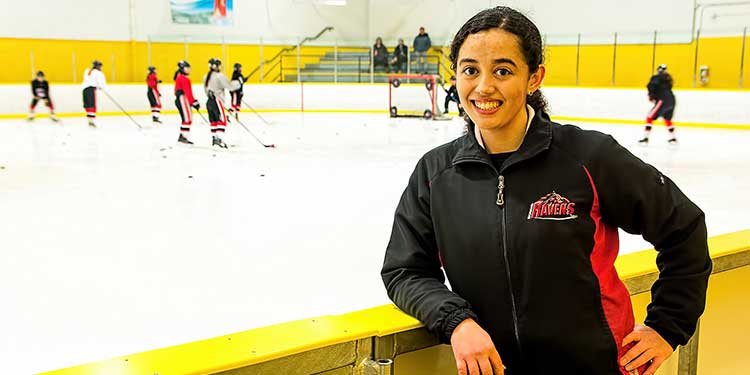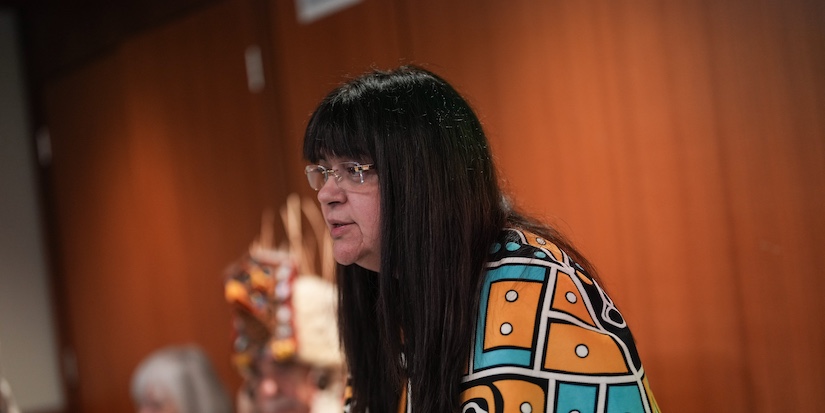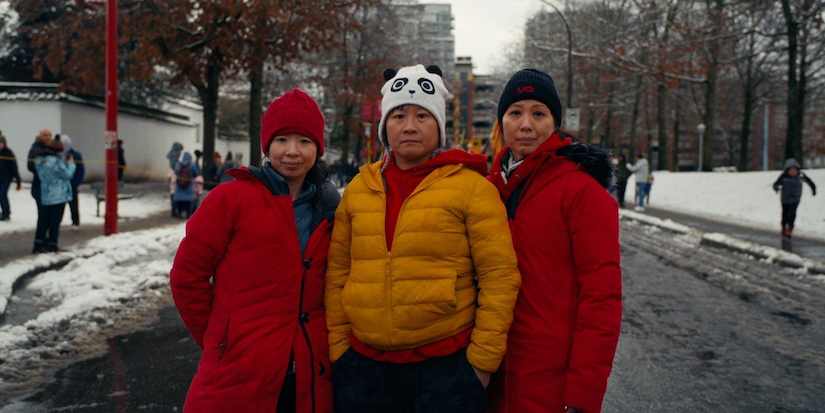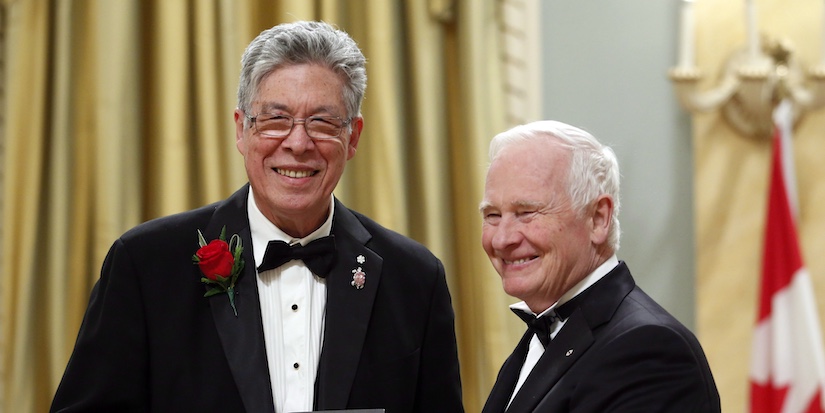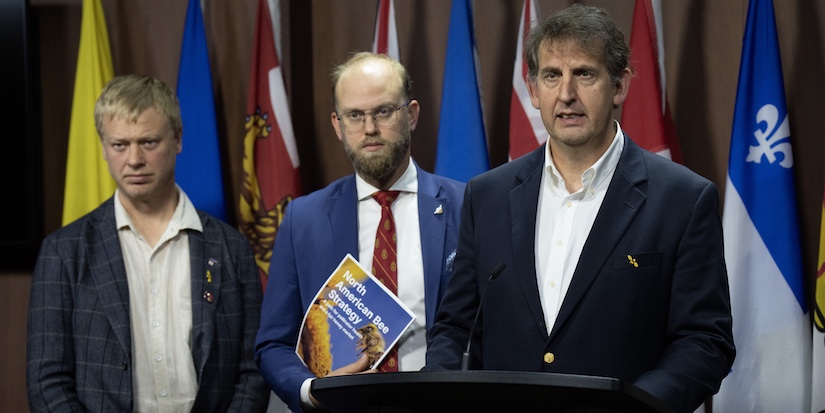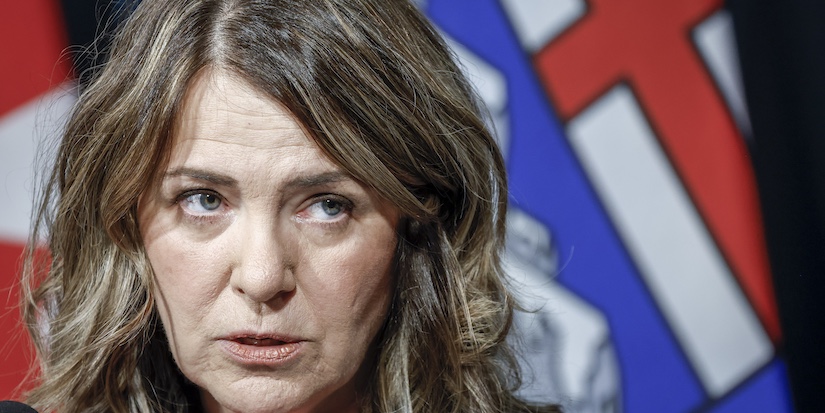Sports
Ravens' coach is also a Devil of a player
Natalie Korenic started playing ice hockey at
the age of six. But like many kids, she was playing street hockey long before
that.
“When I was three, the kids in the
neighbourhood, who were all quite a few years older than me, decided they
needed a goalie,” she recalls. “So they stuck some pads on me that nearly went
up to my chin and told me to stand in net.”
Fast forward, and Korenic is now both playing
and coaching the game she grew to love.
This weekend, she will trade in her place as
an assistant coach behind the bench of the Richmond Ravens’ Peewee A team to
suit up with the Richmond Devils, who are hosting the senior AA women’s
provincials at the Richmond Ice Centre. However, she’ll doubtless be keeping an
eye on the other action as the Richmond Ravens girls’ hockey association hosts
its 21st annual Ice Classic. That event, also through April 1, features
recreation teams at the Initiation, Novice cross-ice, Peewee, Bantam and Midget
levels from throughout Western Canada and the Western United States.
GROWING THE GAME
“Female
hockey has changed dramatically from the time I started,” Korenic says. “When I
started there was a total of three teams in Richmond. Today, there are three
teams for nine- and 10-year-olds alone. It’s really incredible to see that kind
of growth and interest in the sport.”
Women’s hockey has enjoyed strong growth
globally. Korenic says this year’s Olympics was a perfect indication. While
Korea didn’t have a good team, the fact they had a team at all shows we’re
moving in the right direction.
“Last year, China came to Vancouver and
played against several teams, including my own, in the South Coast league. It’s
great to see Canada do well, but we need a stronger level of hockey across the
board.”
Not long ago, there were calls to take women’s
hockey out of the Olympics because Canada or the United States consistently
beat everyone handily. But as more countries begin developing their teams, with
the Scandinavian countries in particular making big strides, Korenic sees a
bright future. She says the fact NHLers didn’t participate in men’s hockey at
these Olympics also meant more people were watching women’s hockey, and were
awed by the skill.
However, she stresses that level of exposure
once every four years is not enough. There are two professional women’s leagues
in North America, but no teams in B.C. And none of the players get paid much.
“A great inspiration for how to have a
properly functioning women’s league is Australian rules football. They brought
in a women’s league two years ago and they have been filling stadiums.”
Class valedictorian of her 2010 graduating
class at Steveston-London Secondary School, _she is now business operations
lead at Aspect Biosystems. The company is at the leading edge of 3B bioprinting
and tissue engineering. But the visionary 20-something Korenic is taking a more
traditional approach to the B.C. women’s championships. As cliche at it may be,
she says the Devils are approaching them one game at a time.
“We’re not a high scoring team, but we’re
fast and hard working so we need to use that to our advantage. Every team in
our league can beat any other.”
Korenic says there are no dreams of a pro
hockey career for any of the players competing in this weekend’s tournament.
They’re all either working or going to school, and hockey is a way to stay active
or socially connected.
“We are all fortunate to have a place to play
competitively after minor or college hockey, so I hope that our league is able
to continually improve and grow. I hope the B.C. championships helps promote
this (opportunity).”
EXPERIENCE AT EVERY LEVEL
Not unlike her own journey as a player,
Korenic has coached every level of Ravens’ hockey. She is currently assisting
with the Peewee A team.
“I did one year of Can-Skate when I was five,
but switched over to hockey the following season,” she explains. “I was wanting
to play hockey like the boys, but the switch was also instigated by the fact we
had to do a skating carnival at the end of the year. All the girls had to dress
up as Miss Piggy in pink tutus. That definitely sealed the deal.”
Korenic thinks it’s a misconception kids need
to learn to skate before starting hockey. At the young ages, she argues, hockey
is a great place to learn to skate.
“With all the gear on, you’re not afraid to
fall. In fact, you’re taught how to fall and get up properly.”
Korenic was one of only five players on her
Initiation squad, making the Atom Bulldogs her first “real team.” But there was
a wide range of ages, the youngest player being five and the oldest 10. With
female hockey still in its infancy, such age gaps were typical in her first few
years. She played Peewee for five years between the ages of seven and 12.
“My favourite team would have to be either my
second-year of Peewee or second year of Midget,” she says. “I don’t think we
won any trophies or banners, but I remember that being such a great Peewee
season. I think it was that we had such a cohesive group of players, a
supportive parent group who enjoyed spending time a the rink together, and a
fantastic coach who pushed us to work hard while still having fun.”
SANDER STRONG INFLUENCE
The Midget season was similar.
“AJ Sander was a fantastic coach through all
my three years. He creates a special kind of atmosphere, and you really become
entrenched in it.”
Having coached more than a thousand games
during his long, and decorated, coaching career, Sander has contributed to the
development of female coaches as much as anyone, Korenic suggests.
“Over the last several years, he has brought
back many of his past players and developed their coaching abilities. When I
played for him, all his assistants were past players as well as from his days
coaching boys.”
Korenic doesn’t know what specifically
sparked her passion to coach, just that it was there. She wanted to help young
players, just like those who helped her.
“It’s just different when you have a younger
female coach because you feel like you can relate to them,” she says. “You
start to see yourself in them and see the potential of what you can do.”
In her 12 years of minor hockey, Korenic had
two such assistant coaches in Dana Pretty and Katie Malysh.
“Now more than ever, we see more women
playing the sport and increasingly more women are referees. But I still don’t
think are enough women behind the bench, and not enough being done to put them
there.”
PROUD OF PEEWEE’S PROGRESS
After coaching with the Midget A team for the
last three years, Korenic realized she missed working with a younger age group.
She credits Peewee A head coach Gord Taylor for inviting her to join the staff.
“I’ve learned a lot from him and we’ve had a
great time coaching together this season,” she says. “We came in with only one
returning player, and the rest had never played rep before. So everyone learned
a lot about what it takes to compete at that level.”
One of the biggest differences is the
tenacity and physicality required.
“Sure it’s non-contact, but you still have to
get in the corners and bump people around a bit to get the puck,” Korenic
explains. “In September we lost several games by seven, eight goals. But our
players wanted to learn and get better and were willing to work hard for it. By
the end of our season we were having one- and two-goal games, and we finished
first at a tournament in San Jose in January. It was great to see the players
build their confidence.”
Korenic says everyone wants to win,
especially the top prize at the end of the year. And she believes it’s
important players work towards these goals. But at the end of the day, it’s
important to put things in perspective and measure success by improvement.
HARD WORK HAS ITS REWARDS
“Hard works beats skill,” she says. “Be
aggressive, determined and relentless. As a coach, I would rather have a weaker
players that works hard than a more skilled player who is lazy.”
Korenic also implores her players not come
off the ice saying: “I could have been better.”
“I heard this from AJ throughout my years in
Midget, and it’s something that has stuck with me. Now I pass it along to the
players I coach. He instilled in us the importance of working hard for
ourselves, but also playing for the rest of the people on the ice with us.”
She says communication is another key to
success. But for whatever reason, younger players in particular have a hard
time grasping its importance.
“In the league I play in (Senior A women’s)
communication is critical, and you can hear players talking the whole game.”
As much as Korenic loves hockey, though, she
eventually needs a rest. And she’s looking forward to an off-season.
“I am a strong advocate for not playing hockey
all year round. I don’t think any kid should be playing just one sport. Kids
often get burned out because they play a full season though the winter, then
play spring hockey, and then do camps through the summer. It’s great to do a
camp or two to stay fresh, but throughout my years of minor hockey I switched
between softball, lacrosse and field hockey. Not only is it important to
develop the different muscle groups and transferable athletic skills, but you
also get to meet different groups of people.”
